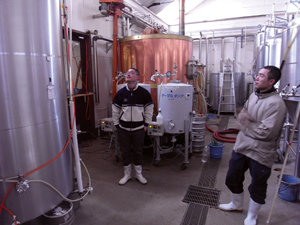Iwatekura brewer Niwa Satoshi was back and it was good to see him doing what he does best: making some of Japan’s finest craft beer. The boiler had been repaired where, weeks before, just after the quake, they had propped it up with kegs to keep its legs from buckling further and falling over. A few of the multi-ton tanks had been ripped out of their bracings in the floor and had bounced several inches from the powerful jolts—they were back in place, too. Elsewhere, in another part of Iwatekura’s beautiful, historic campus, one wall of the structure had toppled onto the house next door.
When I first arrived in Ichinoseki after the quake, there was nothing—no food in the stores, no heat or water where I was staying, no fuel and certainly no life to the city. There were plenty of frightful aftershocks, some of them above magnitude seven. The brewery and restaurant were not operational, but the staff gathered in the courtyard for lunches on an open grill. It was obvious that this was more than a business; it was like a family. Sato Kôki is the third generation owner of the company, which is actually called Sekinoichi, while his son, Sato Wataru, handles much of the day-to-day operations.

As roads opened up and other teams arrived, Sato Jr. participated in the delivery of goods to cities on the coast. He also set me up with some local organizations and shelters as I tried to coordinate the shipment of many relief supplies donated from friends and sponsors. Naturally, I had numerous occasions to drink Iwatekura beer (it was still available in bottles from their store) while working out of Ichinoseki. It was a comfort as we sipped them after a day’s work, not only because the beer was good, but also because good people make it.
Eventually, as business resumed, we were able to drink it on draft and, during Golden Week, sit down with Niwa for a talk. Niwa is actually a newcomer to Iwatekura, having joined in late 2009 after a long stint at Hakusekikan. Before that, Sato Jr. was largely in charge of brewing.
Niwa begins, “When the brewing laws changed in the mid 90s, my company wanted to try craft beer. I love beer, so I thought, ‘no problem.’ Both the equipment and the brewer who briefly trained me came from England. I originally learned four recipes: lager, pale ale, golden ale and smoked ale. I tweaked those recipes about a year later.”
Niwa’s early successes prompted him to explore other styles. He famously made a super-vintage barley wine at Hakusekikan as well as some of Japan’s earliest real ale. But not everything went as planned.
“I’ve had a lot of failures. I had to dump my first barley wine—my employers then weren’t happy about that. I also gave Belgian lambic a go, but had to brew it several times before getting it right.”
Niwa still has a keen interest in Belgian style sour beers and wild yeasts, proclaiming, “I want the world to know we can make these kinds of beers here in Japan.”
We ask him which Belgian beers he likes and he mentions Duchesse, one of our favorites, also a brewery we’ve visited. Duchesse lets their flagship beer mature in oak barrels for a year and half. Niwa seems undaunted by the challenge.
“I want to make a beer like that more than anything. I want to brew a barley wine in whiskey barrels, but if it’s not white oak, you can’t do it.”
You have to wonder sometimes if everything has already been explored, if every possible kind of beer has already been brewed. No way, says Niwa.
“I’m going to make a stout with wild persimmon yeast. There’s so much to be done with yeasts. I basically want to keep make uniquely characteristic beers…until the day I die.”
Long live Niwa!
Although Niwa has introduced a range of new styles to Iwatekura’s line-up, including a real-ale IPA at 7%, the brewery is widely known for its oyster stout, which won a silver medal at the 2008 World Beer Cup. The man who harvests the oysters for them lives and works in the tsunami area and was, for a time, out of contact. It turns out he was busy looking for survivors as a part of the local firemen’s brigade. Another reason to drink the beer, and love it!
Ichinoseki hosts an annual beer festival in August, with over 60 breweries and nearly 100 varieties of beer. This year’s event will go on! (Aug. 19-21)
This article was published in Japan Beer Times # () and is among the limited content available online. Order your copy through our online shop or download the digital version from the iTunes store to access the full contents of this issue.



